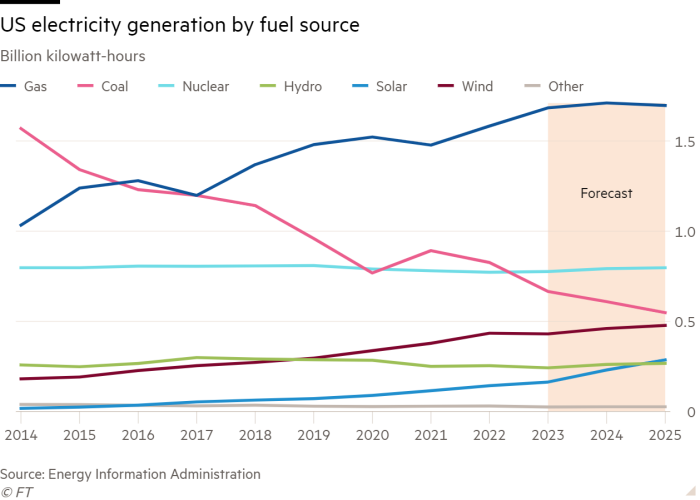Unlock the Editor’s Digest for free
Roula Khalaf, Editor of the FT, selects her favourite stories in this weekly newsletter.
The biggest US renewable energy developer has expressed confidence that Republicans would not follow through on threats to rip up the Inflation Reduction Act if they win this year’s election, as the company reported record orders for 2023.
Republicans have vowed to hollow out the IRA, President Joe Biden’s landmark climate law, whose extensive tax credits for clean energy projects have made it a flashpoint in the election debate.
But John Ketchum, chief executive of NextEra Energy said such an outcome was “unlikely” as the company offered a booming demand outlook for the years ahead after banking 9,000 megawatts of new orders for solar and wind power and battery storage in 2023.
“In the 21 years I’ve been at the company, as we’ve changed administrations and as we’ve seen changes in Congress, we’ve never seen a change or repeal of tax credits — no matter what form they’ve taken,” Ketchum told analysts on Thursday.
He said it was “really hard to overturn existing law . . . no matter what the political winds are”, pointing to Republican’s fruitless efforts to roll back Obamacare during the Trump administration.
With a market capitalisation of nearly $120bn, NextEra ranks as the fourth-biggest US energy group after oil companies ExxonMobil, Chevron and ConocoPhillips.
The Florida-based company, which also owns the state’s largest electric utility, has now booked two consecutive years of record renewables and battery storage orders totalling 17,000 megawatts of capacity.

By 2026, if targets are met, it will have a portfolio of 63 gigawatts in operation, more than all but nine countries in the world.
Ketchum made his comments as NextEra reported annual net profit of $7.3bn in 2023, up from $4.2bn the previous year and ahead of the $6.9bn pencilled in by Wall Street analysts, as polled by S&P Global Market Intelligence. NextEra shares rose almost 2 per cent in early trading.
The surge in demand for new renewables capacity has been boosted in part by the IRA, which provides 10 years of tax credits for the construction and production of wind, solar and other forms of clean energy. The US Energy Information Administration has forecast that combined wind and solar generation will outstrip electricity from coal for the first time this year.
Biden has made the legislation a pillar of his re-election campaign. But his opponents argue the huge spending triggered by the law has helped to push up inflation.
Much of the investment driven by the IRA has benefited Republican districts. Ketchum said members of the party looking to unpick the legislation risked harming their own constituents.
“If you think about where the investments are being made around IRA and where a lot of the benefit of IRA is flowing, it’s flowing to Republican states and it’s flowing to parts of those states that are really difficult to stimulate economically,” Ketchum said.
NextEra’s results came in spite of problems that have affected some players in the renewables sector, including supply chain issues, inflation and higher interest rates.
The group said it had stocked up on enough transformers and breakers — key pieces of electrical equipment that have faced supply shortages — to cover its buildout until 2027 and that declining interest rates would provide a strong tailwind in the years ahead.
Climate Capital

Where climate change meets business, markets and politics. Explore the FT’s coverage here.
Are you curious about the FT’s environmental sustainability commitments? Find out more about our science-based targets here







